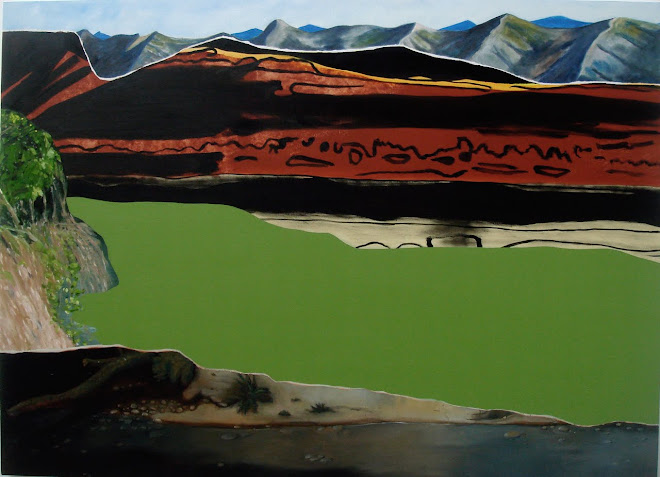An estranged son of Osama Bin Laden is quoted as stating that his father hated the enemy more than he loved his family. This strikes me as about as perfect a definition of war as one can devise. Hating your enemy more than you love your…fill in the blank.
I played a solo show in Krakow last week. My time in the Polish city coincided with the 21st annual Festival of Jewish Culture. On my afternoon off, I attended a lecture by lapsed American academic Daniel Pipes. As the talk was held in an active synagogue, all the men were requested to cover their heads and Pipes' careless positioning of his kipa yanked a clump of uncooperative hair away from the rest of his coif, producing the disconcerting appearance of a crow's beak agape and silently squaking for help from the back of his scalp. Unfortunately, this was the most uplifting feature of the event. Pipes spent his hour making the case for why Europe will soon become "Eurabia," ruled by sharia, with a mosque on every corner and schoolchildren genuflecting towards Mecca. His prescription for dealing with this imminent threat was expulsion and violence. After an hour of enumerating the many ways that Islam is fundamentally at odds with the humanism of Christian tradition, Pipes, responding to a question from the audience, expressed the fear that Christians might have to leave Europe to avoid persecution, if they were not in fact driven out. It strikes me that a temple, in a city once home to 250,000 Jews and currently, (in large part thanks to the ignoble exploitation of "Christian" values), coddling a precious 192, might not be the ideal venue for expressing such fears. Pipes continued the question and answer session with the observation that the Front National in France exists because of the large Muslim presence in the country. While ignorant of both French history and the history of the FN, it would seem unnecessary to point out that this is tantamount to saying the Nazis existed because of the Jews. In any case, by this point I'd had enough. My own attempts at questioning the lunatic at the podium resulted in more of the same, (albeit with loud applause from a good part of the audience and thanks from the the ushers). I left the synagogue for sound-check, stopping on the way to change into my Djellaba and Moroccan slippers. Just playing my part in the inexorable advance of Islamic influence. Although my son says the pointed hood makes me look like I belong to the KKK. (They didn't take that baby away..!)
I remember, before the Berlin Wall came down, going to the Polish embassy in Vienna to get my visa. Growing up in a college town in Massachusetts, with stints in New York and Switzerland, antisemitism was something I heard about but didn't experience personally. (The big music festival where my parents weren't invited because "the director hates Jews" was one refrain.) I was completely unprepared for the look from the middle-aged, Polish clerk at the embassy counter in Vienna, whose blue eyes, perfectly framed by her stiff blonde flip, focused her disdain on the wondering Jew aiming perhaps to--what?--re-populate her decimated, but at least Jew-less homeland? This look, which has stayed with me for decades, I know because I possess it myself. It's the same annihilating stare I fire at Hassidim on the streets of New York. If only looks could kill! In Vienna, where I played a few days before Krakow, I had a similar experience with another blond, disdainful head. This time male and much more recent. The desk clerk at my hotel when I asked how to get to the holocaust memorial.
And yet, Krakow and Vienna are two of my favorite cities. Places where I've had magnificent moments of revelry and music. Where the majesty and elegance of humanity are abundantly evident. And where people laugh freely--or so it seems when I'm heading east from the sad plains of Germany. This isn't a put-down of Germany. In fact, I'm coming to believe that the Germans are so sad out of a certain inchoate sense of the "perfection" of their society and the attendant emotional void. It's sad that there's nothing to be sad about here. Problems? What problems!?
In the garden of the Kuenstlerhaus Dortmund a few days ago, I performed live music to the videos of Pat Arnao. (Again, dressed for the stage in Djellaba and babouches.) My palette of samples and loops included Mahalia Jackson's Trouble of the World at one eighth original speed. I'm guessing a more wailing lament hasn't been heard in these parts for some time. The accompanying video is from a series "I Wasn't Laughing Then." The artist refers to them as "moving paintings."
Since the rawness of emotion is expressed without any imposition of morality, it is free of sentiment. As a provocation to the viewer to interpret any meaning subjectively and internally, it creates a personal, spiritual experience that, at this late stage of human development, I would have hoped would have replaced religion. 2010 Booker Prize winner Howard Jacobson, in a recent comment on God, post-Creation and contemplating a purer time, observes that "…God remembers his long-abandoned artistry--morality has come to occupy his time now…"
Some sort of moral system is necessary for us to survive with one another. But with morals come absolutes. And purpose. And the perceived lack of same in our opposites--from another country, another clique, another church--all too often leads us to hate them more than to love our own. Which is really where it all starts. Not with purpose or morals, but with creation. Not god's, but our own. As Dostoyevsky wrote, "beauty will save the world."
